Inherit the Wind Again?
Next Act Theatre’s fine staging of Ten Questions revisits the issue of evolution vs. religion (and creationism). Who wins?
In 1961 when Inherit the Wind starring Spencer Tracy and Frederic March hit the Milwaukee screens six years after the play stunned Broadway with a bold fictionalization of the 1925 Scopes “Monkey” trial in Tennessee, my enlightened Jesuit theology teacher at Marquette University made a prediction to his class. This dramatization of what he called “our God-given right to think” would finally end “any religious cult” arguing incompatibility between Darwin’s theory of evolution and the biblical tale of the Creation.
He was probably the kind of social optimist who believed the Selma march 50 years ago would put to rest the civil rights conflict.
Today the war between creationism and evolution continues just as hard in slightly new guises, down to so-called ‘science museums” in several states where schoolchildren are taken to see man astride dinosaurs. Few dramas have been brazen enough to explore directly and intelligently how that church vs. science rationale is shaping the adolescent mind, certainly not with the vigor and modern cultural terminology of experienced Canadian playwright Stephen Massicotte. Even in front of an evolution- friendly audience at Next Act Theatre (in a state where more than a dozen schools still do teach creationism as the basis of science), the bluntness of the division set off melodramatic sparks in Ten Questions (to Ask Your Biology Teacher About Evolution).
The “Ten Questions” are actually a snare set by creationists to unsettle Ms. Kelly, the devoted new biology teacher in a conservative Midwest community. She knows that however she answers it’s a trap. Yet she remains determined to open the mind of surly, clever Raymond, the devout, disruptive student convinced the world is 6,600 years old and that she along with Darwin is the devil’s tool. Raymond is motivated by his own upbringing and the desire to please his widowed mother, a rabid fundamentalist who has influence with the school board. Mr. Lester, an alert bureaucrat and acting principal with something of a yen for Ms. Kelly, tries to run interference.
This could merely be an ideological cartoon debate with smart punchlines and arranged character clashes. What keeps us attentive even when not convinced is an expert ensemble under an expert director, Shawn Douglas. He never calls attention to his staging devices (there are illustrated classroom slides to bring evolution down to earth) but encourages quick emotional responses and humanistic kernels from assured actors.
Along with genuine theatrical skills, Massicotte has a tendency to overwrite. His passion to sweep the audience up in the discussion can’t disguise that this is a loaded debate with three endings, several puppet strings and a football field confrontation that comes across as manipulative.
He’s trying to give faith its fair due, but has concocted yet another extreme evangelical mother almost paranoid in her attitudes facing a science teacher of fast comebacks, an understanding, “can’t we all get along” principal and a high school kid so bright in his repartee yet so slouchily defiant in his body language that the audience wants to kick his Christian devotion into the next century.
That we almost believe in these cutouts reminds us that interesting contemporary commentary on social issues requires good casting first and foremost. It’s an important lesson for theaters to learn. People over flash. Acting talents can carry us past the cloying and invigorate those confrontations that in wiser moments we know are artificial.
Not that the debate doesn’t have moments of fun – but not on its own. These actors mine the best laughs in the asides not the putdowns. They downplay the obvious or elevate the maudlin through the audience rapport they’ve established.
Massicotte is astute enough to honor the heritage of the debate, even quoting Inherit the Wind’s arguments and finding his own metaphor to slap together Darwin’s “Origin of the Species” and the Bible. It’s the same message in a new drama – affinity after brutal conflict, tolerance for the appeals of both science and religion, co-existence between proof and faith.
Essential to the production’s success is Deborah Staples, an actress rightly beloved of theatergoers whether the role be classic or contemporary. She has moved from an astonishingly nuanced performance in the Milwaukee Rep’s “The Amish Project” to winning cinematic naturalness as Ms. Kelly.
The aura of believability she creates out of a familiarly motivated role deserves a tribute even warmer than the one provided her in the Next Act newsletter by the theater’s artistic director, who also happens to be her husband and co-star. As Mr. Lester, David Cecsarini slides in with relaxed wit to cool the anger and charm both the audience and the amused biology teacher.
Another familiar Milwaukee actress, Mary MacDonald Kerr, works hard toward providing fuller dimensions than written for the uptight anti-science mother. Kyle Curry, playing younger than his real age as Raymond, almost makes convincing a high school student who sounds like a college graduate. He has the right mannerisms and dry delivery, but we can never quite believe the unthinking creationist rhetoric he spouts.
Dominique Paul Noth served for decades as film and drama critic, later senior editor for features at the Milwaukee Journal. You can find his blog here.
Ten Questions Gallery
Review
-
Eating Burmese in Bay View
 Dec 13th, 2025 by Cari Taylor-Carlson
Dec 13th, 2025 by Cari Taylor-Carlson
-
Casablanca Is a Milwaukee Success
 Nov 30th, 2025 by Cari Taylor-Carlson
Nov 30th, 2025 by Cari Taylor-Carlson
-
Oh, Those Witty 18th Century Brits
 Nov 24th, 2025 by Dominique Paul Noth
Nov 24th, 2025 by Dominique Paul Noth
Theater
-
Oh, Those Witty 18th Century Brits
 Nov 24th, 2025 by Dominique Paul Noth
Nov 24th, 2025 by Dominique Paul Noth
-
Skylight’s Holiday Show Is Lots of Fun
 Nov 16th, 2025 by Dominique Paul Noth
Nov 16th, 2025 by Dominique Paul Noth
-
Rep’s ‘Come From Away’ Is a Triumph
 Nov 10th, 2025 by Dominique Paul Noth
Nov 10th, 2025 by Dominique Paul Noth




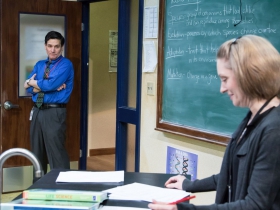
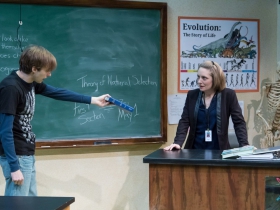
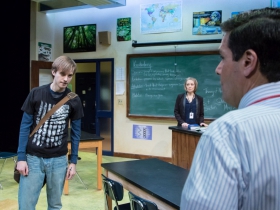
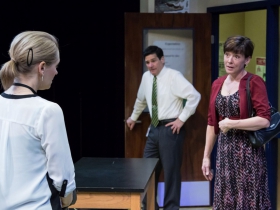
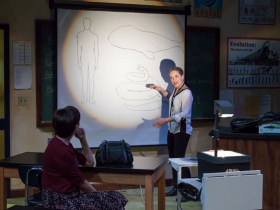



















Many people don’t understand the purpose or the methodology of science. What they understand is the caricature that is presented in the media (and unfortunately, sometimes in the classroom, when the teachers themselves are poorly trained).
It isn’t the purpose of science to prove anything. If more people — Christians and atheists alike — understood this, our Christian witness to atheists would be much more effective. Proofs are for mathematics. Science only offers the best available explanation for a set of facts. Such an explanation, when it is well-supported, is called a theory. It’s funny how some people decry the use of statistical models in climate change, and then it’s usually those very same people who turn around and use statistical models (very poorly made ones) to “prove” how evolution cannot be true.
Gravity is a theory. So is evolution. They are both extremely well-supported theories, and they are both observable — even macroevolution. And for Christians (like myself), there is nothing in the theory of evolution that preludes God’s involvement. God is the cause, but Christians should at least be open to the possibility that macroevolution is the method that God used for the diversification of life over millions of years.
http://truecreation.info
http://truecreation.info/is-evolution-statistically-impossible/
http://www.talkorigins.org/faqs/comdesc/
http://phylointelligence.com/evidence.html
And for those who decry “Darwinism”, recognize that there is nothing in Darwin’s writing which precludes the existence or direct workings of God in nature.
http://www.americanthinker.com/articles/2011/09/what_darwin_said_about_god.html
Nonetheless, equating the modern theory of evolution with “Darwinism” would be akin to equating the modern theory of gravity with “Newtonism”. We’ve come a long way in both. Do science offer all the answers? Nope. For all we know about gravity, we still don’t know everything about how it works. Gravitons? Gravity waves? These things are still being tested. Similarly, we don’t know every last detail about evolution. But the theory paints a very consistent picture of how life diversified.
“In a nutshell, …..in order for evolution to be a theory, it must have numerous successful experiments to its credit as well as numerous unsuccessful experiments to disprove it. Evolution has none of each, so it cannot possibly qualify as a theory.
To qualify as a hypothesis, it must have at least one successful experiment to its credit. All experiments to prove evolution have been 100 percent absolute failures; so it cannot qualify as a hypothesis. To qualify as speculation it must be harmonious with the laws of physics, chemistry, and biology. Not only is it out of harmony with those laws, it is exactly the opposite. Devolution, the exact opposite and excluder of evolution, is the rule in the entire universe. If evolution is not a theory, nor a hypothesis, nor even a speculation, then what is it? It is an inverted fantasy, like the moon jumped over the cow”
–“Transformed by the Evidence: Testimonies of Leading Creationist” (Edited by Doug Sharp, B.S. and Jerry Bergman, Ph.D., 2014, page 167.
Get the book on Amazon. Read it, learn it, live it!
Evolution is a myth for people who cannot stand the thought that the Bible, as written, may be true.
We know gravity is a fact, because every time we let go of an object, it falls to the ground. The only reason we call gravity a theory, is because we don’t know what it is. Evolution cannot even begin to be equated with gravity.
No, evolution at the macro level cannot be observed.